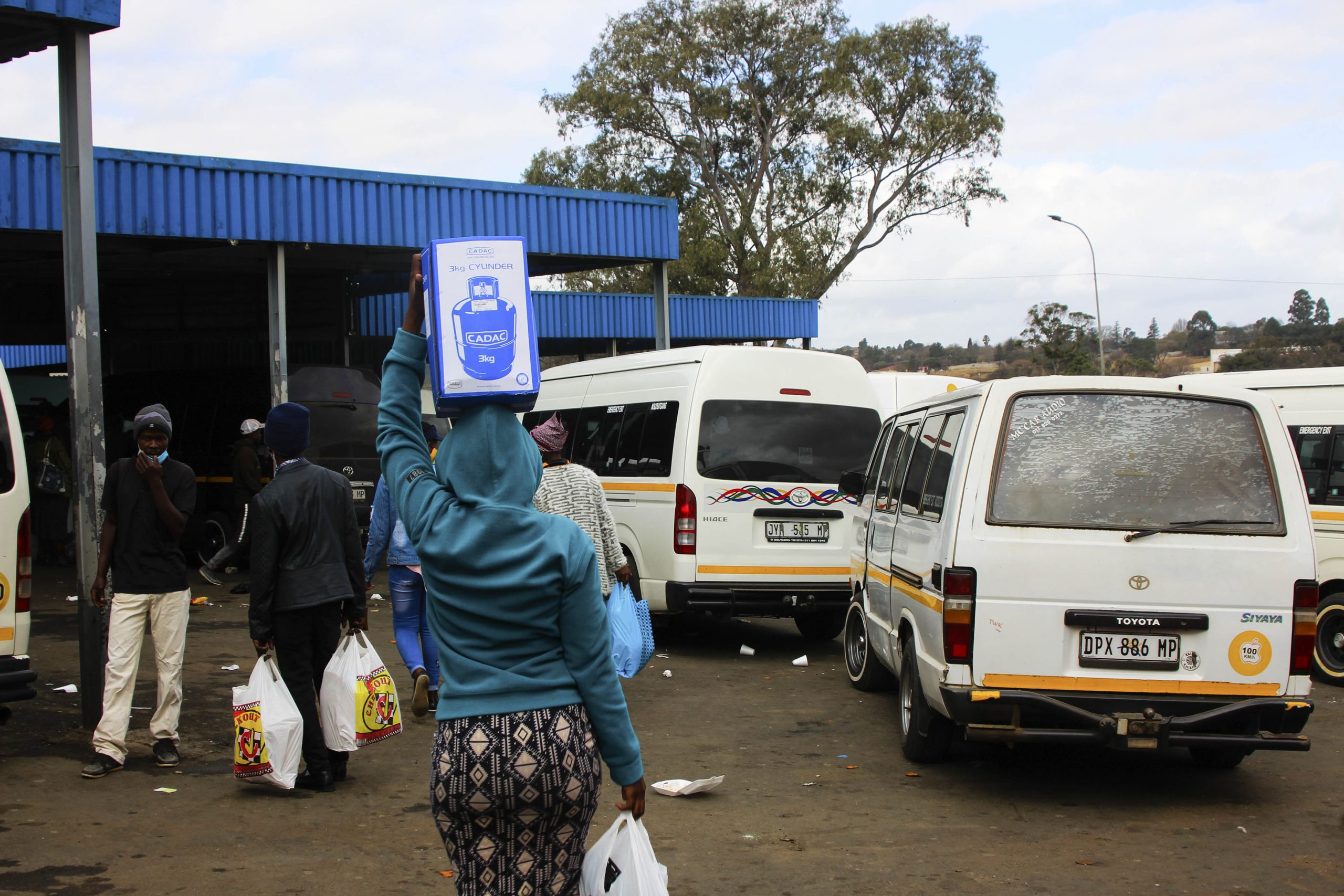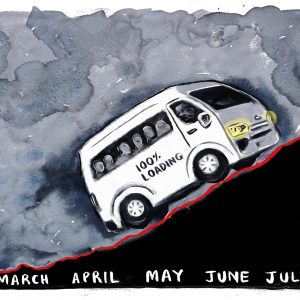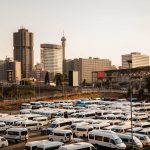Long Read | Fully loaded taxis are a Covid time bomb
While there seems to be agreement between the government and the taxi industry in relation to Covid-19 regulations, commuters and taxi drivers find themselves without a voice.
Author:
3 August 2020

Mandlakhe Nkosi*, 45, works as a security guard in the Johannesburg CBD. He uses a minibus taxi to commute to and from work. However, the increment of taxi fares strains him deeply. On 21 July, his taxi fare from Turffontein increased by R3 per trip.
“Ukufa kwakhona sekukabili. Bayasibulala ezikhwameni baphinde bas’bulale nge-Covid-19 [We are dying two deaths. They kill us in our pockets and also with Covid-19 by loading at full capacity],” said Nkosi.
Just to save money and be in a position to send some back home to Bulawayo, Zimbabwe, Nkosi says he is sometimes forced to walk to work when doing night shifts. He stays with his wife. His three children back home, including his mother, all depend on his meagre wage.
“Well, increasing the fares cannot be equated with the Covid-19 losses, it was our annual fare increase as an industry. Those commuters that are complaining about the fare increases, it is funny that they don’t complain about the price of bread that goes up annually. There are other basic commodities that people use and those prices have gone up and nobody is complaining about that,” says Theo Malele, spokesperson of the National Taxi Alliance (NTA).
Related article:
Malele is correct that the prices of food in supermarkets have increased, affecting low-income families especially. The Pietermaritzburg Economic Justice and Dignity group (PMBEJD) noted in their monthly household food index that the household affordability crisis has been deepened by the taxi fare hike. In the report, they noted that 50.9% of the R3 488 minimum wage goes to electricity and transport, which are non-negotiable expenses before any other expenses are paid.
This hike mainly affects low-income communities. The Pietermaritzburg-based economists project that these households will be spending 62% of their income on transport and electricity. “Even more food will be removed off the plate to pay for transport and electricity,” they say.

How did we arrive at full loading capacity?
On 12 July, despite the exponential increase in active cases and Covid-19 infections, President Ramaphosa announced that minibus taxis may carry 100% of the licenced capacity on any trip not longer than 200km. And can only load 70% in long distance or interprovincial trips.
Researcher and economist Julie Smith of the PMBEJD group said: “100% loading capacity was inevitable in the absence of government intervention to support commuters and the industry in subsidising fares.”
Related article:
How, many will wonder, did the government get to pass a regulation allowing minibus taxis to load at 100% capacity for local trips in the midst of a Covid-19 pandemic? A short answer: the government endorsed and formalised an already existing industry practice.
Way before President Ramaphosa’s pronouncement on full capacity, the South African National Taxi Council (Santaco) had urged drivers to ignore the 70% capacity gazetted by the state and load at full capacity. This defiance of national lockdown regulations came after national protests by the taxi industry. This followed a series of negotiation failures between the taxi industry and the transport department.
At first, the department had said that the industry could only load 50%, only to amend this figure to 70% at the approach of lockdown Level 3. This resulted in severe financial losses for the industry, according to taxi associations. The government offered R1.1 billion as a Covid-19 relief, which the taxi industry rejected. They complained about the conditions that came with the relief grant. Owners and operators also said that the amount was too little for an industry that had lost billions of incomes as a direct consequence of lockdown.

There are over 200 000 minibus taxis in South Africa. According to the department, each was going to receive R5 000. The money would have to be shared with the driver. Taxi operators rejected this and demanded R20 000 per vehicle. The government refused to offer this amount.
Economic impact
The industry raised different problems for this demand, one being that the cost of operating a taxi during the lockdown had been extremely high, a reality the government failed to appreciate.
Malele put this into perspective, saying that previously, depending on how lucrative the route, an operator would get about R3 000 per week, which shrank to R500 during the hard lockdown. “We were actually not making any money at all. The money we made went straight to cover fuel. A driver will be left with only R100, [which is nothing].” And this, for Malele, was strenuous on both the driver and the taxi operator. Both must feed their families.
What made matters worse is that the daily earnings of the industry were further affected because not everyone had returned to work, said Malele.
One driver at Mkhondo taxi rank in Mpumalanga, who asked not to be identified, said that the government underestimates the role of a minibus taxi.
Related article:
“A taxi feeds a driver, an owner, marshal, car washer. The chain is long,” he said. “Is it the taxi business that brought coronavirus, so why does the government punish us?”
Another driver, who chose to remain anonymous, said: “Reducing passengers isn’t just hurting, but actually it is killing us. If the car damages a wheel, that is money, what about services, what about fuel and salary? Not that our salaries get reduced. There is nothing at all. We are suffering from hunger.”
However, at Mkhondo and Ermelo ranks the associations have not hiked fares, acknowledging the strain it would have on commuters. “We are living a hand-to-mouth life, especially since lockdown started. But we shouldn’t increase prices because it is not commuters who have issued a lockdown. And multitudes of people are losing their jobs. Where will they get money for increased fares?” said a driver at Mkhondo.
Drivers on their own
After talks failed between taxi bodies and the government, Santaco encouraged drivers to load to full capacity. If any of the vehicles were impounded, they vowed to shut down the economy.
Drivers that spoke to New Frame met many issues with law enforcement agencies, such as almost being arrested for an overload. Some have almost had their vehicles impounded.
One of the drivers at Ermelo taxi rank, Sphiwe*, usually drives commuters to Mbombela. He says he was stopped by law enforcement officers for loading one extra passenger. They threatened to impound his vehicle. To spare him from the impoundment, he says, the traffic officers demanded a R200 bribe.
“I decided to pay because I was the only one caught and there was no Santaco to assist me. My question to Santaco is [how will they] assist me when I am charged for overloading or when officers threaten to impound the vehicle?”

Sphiwe and other long-distance drivers are sceptical about loading their vehicles to full capacity, even when encouraged by the biggest taxi industry association in the country. “Santaco is like someone who has hunting dogs, he sends them and never does the chase, only are the dogs that have to suffer the brunt of hunting. We are on our own and no one cares about our wellbeing,” said Sphiwe.
With the government endorsing loading to full capacity, Malele says law enforcement has no business in demanding bribes, impounding cars or arresting drivers.
Taxis as disease hotspots
Organised labour, medical practitioners and other non-governmental organisations consider the decision to load to full capacity as reckless.
“In terms of what we know about the spread of this virus and infection control, I don’t agree with this decision and I think it’s a high-risk activity,” said Indira Govender, who has extensive experience working with communicable diseases across the African continent.
“The people with the highest risk for severe disease were those from the lowest income groups. In South Africa, we know that most low-income individuals depend on minibus taxis for transport, so this really puts a huge risk on them. They are also the ones who depend on the public health services for health care and this system is already overwhelmed,” says Govender.
Related article:
A biomedical engineer, Munyaradzi Matose, agrees, saying minibus taxis are high risk areas for transmission of communicable diseases. Tuberculosis is one such disease that thrives in a space with high density of people and low ventilation.
Lynn Morris of the National Institute of Communicable Diseases told New Frame that in 2018 there were about 301 000 cases of TB. Taxi commutes regularly contribute to transmissions.
Ventilation in taxis could help
A scientific research paper, Natural ventilation as a means of airborne tuberculosis infection control in minibus taxis by Matose and his colleagues, suggests that opening windows in taxis works against TB transmission.
Matose said, “The ventilation achievable in minibus taxis can meet and exceed WHO [World Health Organization] recommended rates for airborne infection control facilities. Recent studies are showing that Covid-19 is transmissible via the airborne route, and although I do not know of the mechanisms for its suspension in [the] air, if it is similar to TB, then ventilation will play a large part in reducing transmission risk.”

However, the reality on the ground, says Matose, is that the opening of windows will not be adhered to by drivers, commuters and conductors during cold weather or where there is dust and traffic pollution.
Morris said commuters must insist that windows be opened “at least partially”. “We suggest dressing warmly to avoid getting cold,” he said.
While opening windows might help, Morris, Govender and Matose agree that to be safe, people must go beyond merely increasing ventilation. For instance, wearing face masks is mandatory in public spaces and drivers have been empowered to refuse commuters access to vehicles if they are without masks. If drivers do not enforce the law they will be fined or imprisoned for six months.
Drivers have no protective equipment
In a media briefing after the president’s address, the transport minister placed the responsibility for disinfecting, sanitising and ensuring social distancing on individual taxi operators.
However, the industry is looking to the government to help. “We have requested [the] government to assist us with screening of our drivers so that we have healthy people in our employment. That request seems to have fallen on deaf ears, but we are hopeful with the current political leadership that things will improve,” says Malele.
Drivers that spoke to New Frame say the conditions that they work under are extremely unhygienic, as ranks are not being disinfected. Nor are they being screened, and they have to go to shopping malls or shopping centres to take a temperature test. This is concerning as they are at a high risk of being infected by Covid-19.
Asked about their fear of the virus since they lack protective gear, one driver at Mkhondo taxi rank said: “If we sit and do nothing, who is going to feed us and our families? Even when you come back from work, you don’t even know whether you have it or not. It is a risk and also our families are more vulnerable to be infected as well.”
Related article:
When New Frame asked about taxi drivers and compensation for occupational diseases if they become infected through work, the department of employment and labour did not respond to questions.
In relation to compensation, NTA says that the industry is without resources to cover drivers and calls on the government to assist them through the special compensation fund.
Passengers fearful for their lives
Without proper facilities and infrastructure in the ranks, it is not only the lives of drivers at risk. Commuters are at risk too, of being infected and infecting one another. One passenger at Mkhondo rank who was going to KwaZulu-Natal said: “We are actually dying to tell the truth. We should be 10 passengers because now we do see that coronavirus is here, we said it hadn’t come to Pongola but now it’s come to our family members.”
Another passenger in the taxi said: “As you can see my khonz’ekhaya bag is full of clothes, I am going back to my house in Newcastle with my husband because we’ve lost our jobs.”
Related article:
She said she is scared of the virus because “we could infect our children. There are many people commuting with taxis and some are picked up on the roads instead of ranks, this means that there is no way to sanitise them.” She added, “I am even scared to eat inside a taxi now. It is difficult. It was better when there was social distancing, I felt a little bit safer.”
In the taxi, another passenger is with an infant. Asked if she fears that her child, too young to wear a mask, could be infected, she said she’s deeply concerned but there is nothing she can do.
Workers rejects regulations
The Congress of South African Trade Unions (Cosatu) has added its voice to those against the decision to load local minibus taxis to full capacity, saying this decision will highly expose commuters.
Cosatu’s national spokesperson, Sizwe Pamla, said: “[The government’s decision will] turn the fight against Covid-19 into a farce. It is not a sustainable way of doing anything. In our engagement with the government, they said their biggest fear is that the taxi industry has the potential to disrupt the whole economy.

“But that is not how you run things, let alone a country, because sick and dying people are not productive. You cannot say you are protecting the economy by exposing your people to sickness and death … So that is why we are saying this is a self-defeating exercise. The fact that you are afraid of what the taxi industry is likely to do, it does not mean that you have to throw workers under the bus. At the end of the day, these workers are not selling their lives, instead they’re selling their labour.”
To find an amicable and safe route, Pamla says they’ve submitted a section 77 to the National Economic Development and Labour Council. This part of the Labour Relations Act allows workers to protest against socioeconomic issues that affect them outside the factory floor. Pamla hopes that concerned parties will “sit around the table and reconcile their competing claims and find a compromise and explore a common position that will ensure all the parties’ concerns are addressed and taken seriously.”
Pamla said the decision by the government to load to full capacity “is an act of cowardice [because this] isn’t a decision that was taken by the government … It was taken by taxi associations when in their own negotiations with the government reached an impasse … This is an embarrassing level of appeasement.”
Related article:
The taxi bodies in the country have not kept quiet. In a press statement released on 17 July 2020, Santaco said: “The threats made by Cosatu to embark on a strike should government not rescind its decision to allow full taxi capacity is unfortunate and disingenuous, based purely on its twisted views about the taxi industry. Santaco’s battle with government has been nothing except for the survival of not only taxi associations as alleged by Cosatu, but also for the preservation of jobs of the many semi-skilled workers in the industry, whom Cosatu as an advocate of the workers, has dismally failed to fight for.”
Santaco added that during Levels 5 and 4, about 70% of the semi-skilled workers in the industry were at home for two months without any source of income and “Cosatu remained mum.”
The association went on to say, “We therefore want to assure South Africa, that contrary to popular belief, this government did not succumb to the taxi industry demand.”
The NTA also said in a press statement that it “appreciates the conundrum both the minister of transport and government find themselves in, trying to balance saving lives and allowing the taxi industry to earn a living … No efforts will be spared in ensuring that the regulations promulgated will be enforced … by our associations, members and staff.”
The association added that it noted dissatisfaction and resistance from trade unions and non-governmental organisations on the decision to load to full capacity. “We hereby affirm our respect and high regard of these organisations as both directly affected parties as well as critical stakeholders. However, notwithstanding the correctness of the advice of the NCCC and government decision we would gladly welcome direct engagements with the concerned parties for the purposes of finding a solution to the concerns.”
An industry on its knees
Speaking to the parliamentary committee on transport, chairperson of the NTA, Francis Masitsa, said the industry would be on the brink of collapse if it continued with 70% carrying capacity, especially with the payment holiday coming to an end and many taxi operators being in arrears. He told parliament that it took Covid-19 for the industry to get an audience with the minister of transport to air issues that predate the pandemic.
The Competition Commission showed the taxi industry crisis on subsidies in a report on land- based public passenger transport, made public on 19 February 2020. The commission recommended that the transport department subsidise the industry. The department has not responded to New Frame questions on the issue of subsidies and regulation of the industry.

Speaking to the portfolio committee on transport chaired by Mosebenzi Zwane, the NTA said it had no quarrel with 70% capacity on condition that the state subsidises the 30% shortfall.
The industry told the committee that what made matters more difficult were the instalments that taxi operators pay. These range from R11 000 to R16 000 a month, for the Ses’fikile 15-seater Toyota Quantum. Despite the payment holiday, taxi operators were struggling to pay these instalments before lockdown. The commission has long raised concern about the structure of the minibus taxi financing market.
Many operators opt for developmental credit, which is mainly offered by SA Taxi Finance. Another major player is Toyota Financial Services. Traditional banks are reluctant to finance taxi operators because of “risk”.
Related article:
Because of access to developmental credit by taxi operators who would ordinarily not qualify for credit, 80% find themselves in a position where they cannot service the motor vehicle loan because of high interest rates. Many then have their cars repossessed, according to the Competition Commission.
Some of these problems were considered when the government allowed minibus taxis to load to full capacity. The limited choice some commuters enjoyed of choosing different forms of transport disappeared when transport minister Fikile Mbalula extended the 100% loading capacity to scholar transport. So, wherever commuters go – be it to Ubers and Bolts or to buses – there will be a crowd waiting.
* Names have been changed.







